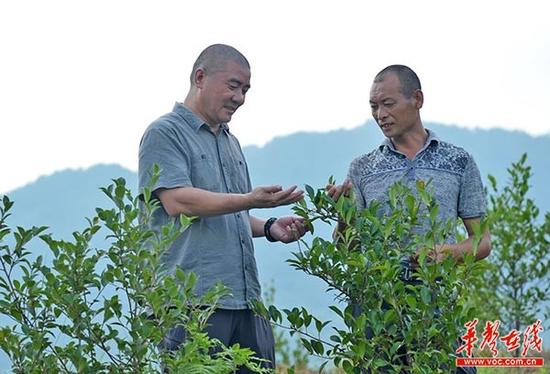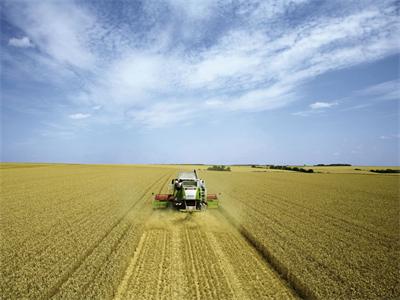Tu Ziping: take farmers back to their hometown to start eco-agriculture and activate the mountains
Character file: tu Ziping, male, 51 years old, from Pingjiang County. Graduated from Tongji Medical University in 1990, chairman of Hunan Ruidan Technology Co., Ltd. In 2009, he returned to his hometown to establish Hunan Ruidan Technology Co., Ltd., focusing on supporting local poor farmers to develop four major industries, including Camellia oleifera, alpine organic tea, rice field fish farming, and Lianyun Black Chicken, with a total investment of more than 1500 yuan. Help six villages improve infrastructure and develop agricultural industry. A total of 4000 farmers have benefited, including 436 precision poor households.

Tu Ziping (left) discussed the growth of Camellia oleifera with the villagers at the Camellia oleifera base.
Hongqiao Town, Pingjiang County, which is located in Mubu Mountain area, is more than two hours' drive from Pingjiang County. The winding mountain road blocked the courage of many villagers to get out of the mountain, while Tu Ziping was the one who walked out of the mountain and returned to the mountain. After returning to his hometown for seven years, he invested in building roads and water conservancy projects, and led his villagers to grow Camellia oleifera and organic tea, and to raise fish and chickens. he has invested more than 15 million yuan to test a variety of poverty alleviation models, and his persistence is changing the face of poverty in the local rural areas. refreshing the ideas and ideas of the villagers.
Unforgettable local feelings paid out of their own pocket to build roads for the village.
"I still like it here. I go hiking up the mountain or going to the fields. The air is fresh and the mood is good." Tu Ziping wandered around the nearby villages in light casual clothes, taking every step at ease, and he could no longer be familiar with the place where he lived when he was a child.
Tu Yiping was born into a poor family in Hongqiao Town, Pingjiang County. His father moved from Nanchang with his grandfather. Due to the transfer, there were no relatives in the area, and the family had little labor force and was in financial straits. At a young age, Tu Yiping had to help his family with farm work and grow sweet potatoes in the fields. The villagers nearby will always go to his house to help after finishing their farm work, and they will bring food quietly when food is tight. "only you can understand that feeling through your own experience, and their help has always been kept in mind." Tu Yiping said.
After graduating from Tongji Medical University, Tu Yiping gave up his excellent job to work in Guangdong. In 2009, he finally returned to the homeland that haunted him and founded Hunan Ruidan Technology Co., Ltd. He has never forgotten to repay the kindness of his villagers. So far, more than 100 poor students have donated more than 1 million yuan. Wei Qiang, a poor student from Daxing Village, Hongqiao Town, received a total of 140000 yuan in financial aid from Tu Yiping for seven consecutive years from studying at Peking University to graduate school. During the Spring Festival, Tu Yiping will bring condolences and visit the five-guarantee households and needy families in poor villages, and has donated more than 100,000 yuan. Poor villagers are short of money to build houses, and he sponsors them. If anyone in the village is sick and has no money for treatment, he will take the initiative to send medical expenses.
In 2009, Renyi Village had less than one kilometer of cement road. Tu Ziping coordinated and integrated more than 1.2 million yuan, of which more than 500,000 yuan was donated by individuals, 4 kilometers of newly built basic highways and more than 10 kilometers of hardened village roads. At the same time, maintain 6 water conservancy projects in Dongan Village and Renyi Village, Hongqiao Town, and improve the irrigated area of more than 100 mu.
"the investment in these infrastructure has changed the backwardness of our local transportation, solved the most urgent problems of the masses, facilitated their travel, improved their production and living conditions, and laid a good foundation for the poor people to shake off poverty and become rich." Hu Yanbing, secretary of the party branch of Renyi Village, said.
Industrial poverty alleviation is sent to the villagers' doorstep.
Hongqiao Town is located in the remote, with many mountains and few fields. For many years, it has been restricted by many aspects, such as lack of funds, no technology, no market and so on. In addition to growing grain, the local people have not developed other industries, the agricultural industry is single, and the channels for increasing farmers' income are narrow. Although the change of infrastructure has changed the appearance of the mountain areas, it has not directly increased the income of poor farmers. Tu Yiping said: "to get rich, we must drive farmers to develop industries."
In order to develop the industry and lead the villagers to get rich, Tu Yiping plunged into the farmland and mountains. At first, he did not take detours because he was not familiar with agriculture. Planting Cordyceps sinensis was tested for a year, but in the end, due to climate inadaptability, all the investment was wasted. Later, he invited experts to conduct field investigations and decided to develop the Camellia oleifera industry in the light of the local actual situation.
Since 2009, Tu Yiping has invested more than 8 million yuan and rented 2200 mu of mountain, driving 580 people from 156families in Renyi Village to develop "Dezi No.1" high-yield camellia. The villagers can not only get the annual woodland rent (19 yuan per mu), but also work in the Camellia oleifera base with a reward of 150-200 yuan per day. Renyi Village villager Deng Ziqing family transfer 20 mu of woodland, he works in Camellia oleifera base, can earn more than 2000 yuan a month. Deng Ziqing said, "six people in my family used to support my family by farming, but now I go to work at the base in my spare time, and my annual income is three times that of the past."
Camellia oleifera has to wait at least 8 to 10 years for mass production, while the continuous investment in tending and weeding needed in the early stage is relatively large. Up to now, Tu Yiping's investment in Camellia oleifera has not been produced. But Tu Yiping persisted. In order to give villagers more opportunities to increase their income, he invested another 1.45 million yuan to develop 150 mu of alpine organic tea in Renyi Village, bringing 52 families to employment.
Let the farmers change their brains and become their own bosses.
The paddy fields are more vibrant in the sun, and the newly built ditches at the edge of the fields are filled with water. This is the rice field and fish culture base of the Qingyangfeng Agricultural Professional Cooperative. Li Helai, a member of the Qingyangfeng Agricultural Professional Cooperative, pointed to the wide ridges in the middle of the rice fields and said: "the increased spacing between rice plants can strengthen ventilation in the rice fields and make more room for fish to move. Rice production will not be reduced, and there is no need to fertilize or fight insects."
In February this year, Tu Yiping invested more than 300,000 yuan to subsidize 12 precise poverty alleviation targets in Renyi Village to set up Qingyangfeng agricultural cooperatives, transfer 160 mu of farmers' land, and develop rice fields and fish farming. Looking at the well-growing rice and the small fish that surfaced from time to time, Li Helai was full of expectation. "the fish fry of 3 centimeters has already grown to 30 centimeters in less than 20 days." Li Helai said at the same time that it is not a problem to produce 500 jin of fish per mu after seven or eight months. Over the course of a year, the average income per mu of land can be increased by 1000 yuan, and the annual income of fish farming in 160 mu of rice fields will reach at least 1.6 million.
"all the income of the first year belongs to them, and I don't want it." Tu Yiping rejected the dividend of the Qingyangfeng agricultural cooperative, saying: "the key is to set up the industry, let the villagers see the benefits, let more farmers become their own bosses, and develop together."
Tu Ziping is not the only local entrepreneurial project supported by Qingyangfeng agricultural professional cooperatives. In 2011, Tu Yiping invested 1 million yuan to support college student Li Gaofeng to return to his hometown to start a business, built a new chicken farm in Guilin Village, Shiniuzhai Town, and led more than 1000 poor families to develop Lianyun Black Chicken, with an annual output of more than 150000 birds. "Tu always brings us not only material support, but also a change in ideas. Led by him, by participating in the cooperative, everyone started their own business with both hands and worked hard to get rich together. " Li Gaofeng said.
To lead the villagers out of poverty and become rich, Tu Ziping has a longer-term plan: to develop eco-agriculture and eco-tourism, to build the brand of leisure farms by relying on the two major tourist scenic spots Shiniuzhai and Mubushan National Forest Park, and to attract tourists with their characteristic agricultural products. become a special post station for the two major tourist scenic spots, and then develop characteristic farm experience projects such as catching fish in the field and picking tea in tea gardens, which will certainly be able to retain tourists. Lead the villagers to true affluence.
- Prev

The "pig star" in Tiandeng County leads the masses to become rich.
The "pig star" in Tiandeng County leads the masses to become rich.
- Next

The Ministry of Agriculture has issued 20.9 billion agricultural machinery subsidies. How much did you get?
The Ministry of Agriculture has issued 20.9 billion agricultural machinery subsidies. How much did you get?
Related
- A course of planting techniques and methods on how to grow carrots
- How to plant the latest tulips?
- Is it better to pick tea in the morning or in the afternoon? When is the best time for tea to be picked? what is the third or fifth tea?
- Launch Yuanxiao Happy combination Haocha + Tea Yuan healthy Taste
- Penghu Tourism "Fireworks 20 Parade with You"
- 2022 West Lake Happiness holds "Digital Revitalization Voucher" and draws iphone13 and laptop.
- Banqiao Fuzhou social houses are designed to change start-up combined with police elimination to create a safe and livable environment
- The convenient measure of "mechanical weeding" in Xinbei has been abused and the Agriculture Bureau has imposed heavy penalties on the illegal land consolidation.
- Changgeng University Joins Hands with Four Memory Factories to Rescue Memory Talent Shortage
- The list of Taiwan's top 100 MVP managers is listed by the Director-General of the Farmers' Association of Sanxia District.

